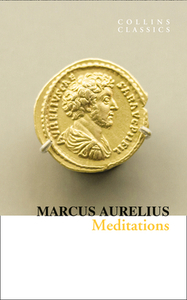Take a photo of a barcode or cover
I read this back in high school and it really drives home how little things have changed to read it again and still get so much out of it.
The majority of this book is just... reminders and well-worded phrases that reflect things many of us struggle with in our day to day lives, and even if it's being filtered both through ancient thought processes and modern interpretations, it still applies.
We're not that different; people haven't changed, and we still struggle with the same things.
Great book for anyone considering old-fashioned morality without turning to the Bible due to the baggage it holds.
Strongly recommend, will read again.
The majority of this book is just... reminders and well-worded phrases that reflect things many of us struggle with in our day to day lives, and even if it's being filtered both through ancient thought processes and modern interpretations, it still applies.
We're not that different; people haven't changed, and we still struggle with the same things.
Great book for anyone considering old-fashioned morality without turning to the Bible due to the baggage it holds.
Strongly recommend, will read again.
Even over the span of a few months, this gets repetitive. The last four books or more offered nothing new to the table.
I don't know why I read this, I never liked the stoics The book is full of pantheism and if Marcus was so good where are the Romans now. His philosophy was a failure in the end and Christianity disemboweled his ideas and reprocessed them in to something believable, I believe.
hopeful
medium-paced
medium-paced
inspiring
reflective
fast-paced
¿Fascinante poder leer los escritos de un emperador de Roma? Por supuesto.
¿Un poco coñazo el amigo? Pues también.
¿Un poco coñazo el amigo? Pues también.
informative
inspiring
reflective
medium-paced
challenging
reflective
slow-paced
Meditations by Marcus Aurelius is a somewhat short book that was written as a sort of diary during a military campaign -- to remind himself of how he should act and why. It was not written as a guide or teaching for anyone other than himself, but it can still provide guidance and rules for anyone who wants to live like him.
Marcus makes many references to the gods, to worship and to divine laws. He's also quick to dismiss the "faithless" as bad people, akin to fools and thieves. While I don't mind that, as he is from a different age, I did mind that nearly all of his teaching relied entirely on the reader also accepting his exact definitions of gods and natural law.
I found it hard to relate to many of his teachings, such as how to treat women and how to treat animals. I also got a bit tired of his repeated morbid positions such as that we are merely corpses temporarily carried around by souls, which he also uses as justification for killing a man -- which he says is not an evil act as death comes to all living things, and to both good and bad people, therefore it cannot be evil. Although as he wrote this moving from battlefield to battlefield, I can see why life and death, and taking another's life, would be on his mind.
I did like some of it, such as his teaching that you should accept what you cannot change (but this does not mean ignoring global problems that cannot be changed by just you alone).
Ultimately, I think this is a good book for modern stoics to get familiar with typical stoic thoughts. He makes mention of Socrates, Plato, and Aristotle, who he clearly admires, although the core of his teachings seem to stem more from Stoic thinkers such as Epictetus and Zeno.
As I am an atheist utilitarian, my views on ethics are very different from stoicism or even virtue ethics. Obviously all these philosophies are just tools, and I can see how virtues or stoicism could work for some to live ethical, good lives. For me, stoicism and this book especially require too much acceptance of divine will for me to find useful.
Marcus makes many references to the gods, to worship and to divine laws. He's also quick to dismiss the "faithless" as bad people, akin to fools and thieves. While I don't mind that, as he is from a different age, I did mind that nearly all of his teaching relied entirely on the reader also accepting his exact definitions of gods and natural law.
I found it hard to relate to many of his teachings, such as how to treat women and how to treat animals. I also got a bit tired of his repeated morbid positions such as that we are merely corpses temporarily carried around by souls, which he also uses as justification for killing a man -- which he says is not an evil act as death comes to all living things, and to both good and bad people, therefore it cannot be evil. Although as he wrote this moving from battlefield to battlefield, I can see why life and death, and taking another's life, would be on his mind.
I did like some of it, such as his teaching that you should accept what you cannot change (but this does not mean ignoring global problems that cannot be changed by just you alone).
Ultimately, I think this is a good book for modern stoics to get familiar with typical stoic thoughts. He makes mention of Socrates, Plato, and Aristotle, who he clearly admires, although the core of his teachings seem to stem more from Stoic thinkers such as Epictetus and Zeno.
As I am an atheist utilitarian, my views on ethics are very different from stoicism or even virtue ethics. Obviously all these philosophies are just tools, and I can see how virtues or stoicism could work for some to live ethical, good lives. For me, stoicism and this book especially require too much acceptance of divine will for me to find useful.

